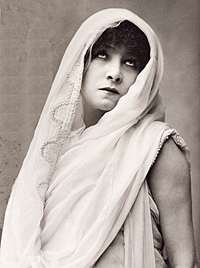In a career spanning more than 50 years, the great French actress Sarah Bernhardt (1844-1923) emerged as one of the most celebrated women of her day, known for a signature acting style based on grand, theatrical gestures and a famously melodious voice.
Next week the Washington University Symphony Orchestra will highlight a series of rarely heard works originally composed for “The Divine Sarah,” who commissioned and revived dozens of musical scores to accompany her plays.

Sarah Bernhardt
The concert, sponsored by the Department of Music in Arts & Sciences, is free and open to the public and begins at 3 p.m. Sunday, Nov. 22, in the E. Desmond Lee Concert Hall, located in the 560 Music Center, 560 Trinity Ave.
For more information, call (314) 935-5566 or email kschultz@wustl.edu.
The program will open with Concerto in tre tempi in C major for Harp and Orchestra (1801) by François-Adrien Boieldieu (1775-1834), a French composer perhaps best known for operas such as La dame blanche. Dan Presgrave, director of the Symphony Orchestra and the Washington University Wind Ensemble, will conduct. Featured soloist will be senior Jaina Krueger.
Elizabeth Macdonald, director of strings in the Department of Music, will then conduct the portion of the program dedicated to Bernhardt. Selections will include a prelude written by Camille Saint-Saëns (1835-1921) in 1903 for Bernhardt’s performance of Jean Racine’s Andromaque, as well as a set of exotic pieces composed by Gabriel Pierné (1863-1937) in 1894 for the play Izeÿl — itself written for the actress by Armand Sylvestre and Eugene Morand. Rounding out this portion of the program will be two excerpts from music composed by Jules Massenet (1842-1912) in 1900 for Bernhardt’s production of Racine’s Phèdre.
The selections are based on research by Erin Brooks, a doctoral candidate in musicology, who is writing her dissertation on Bernhardt and French incidental music. Brooks will introduce each of the musical selections. In addition, since several compositions incorporate spoken text declaimed over music, Anita Hagerman, who recently defended her dissertation in the Department of English in Arts & Sciences, will perform brief excerpts from Bernhardt’s roles.
The concert will close with music from Gustav Holst’s The Planets (1914-16), one of the most frequently performed compositions in 20th-century English music. Holst (1874-1934) was deeply interested in astrology and each of the work’s seven movements corresponds to a planet while also showcasing the composer’s eclectic style. These range from the rhythmic propulsion of “Mars, Bringer of War” to the extroverted lyricism of “Jupiter, Bringer of Jollity” to the plodding resignation of “Saturn, Bringer of Old Age.”
|
WHO: Washington University Symphony Orchestra WHAT: Concert WHEN: 3 p.m. Sunday, Nov. 22 WHERE: E. Desmond Lee Concert Hall, 560 Music Center, 560 Trinity Ave., at the intersection of Trinity and Delmar Boulevard COST: Free and open to the public PROGRAM: Music for Sarah Bernhardt; works by Boieldieu and Holst SPONSORS: Washington University’s Department of Music in Arts & Sciences. INFORMATION: (314) 935-5566 or email kschultz@wustl.edu. . |